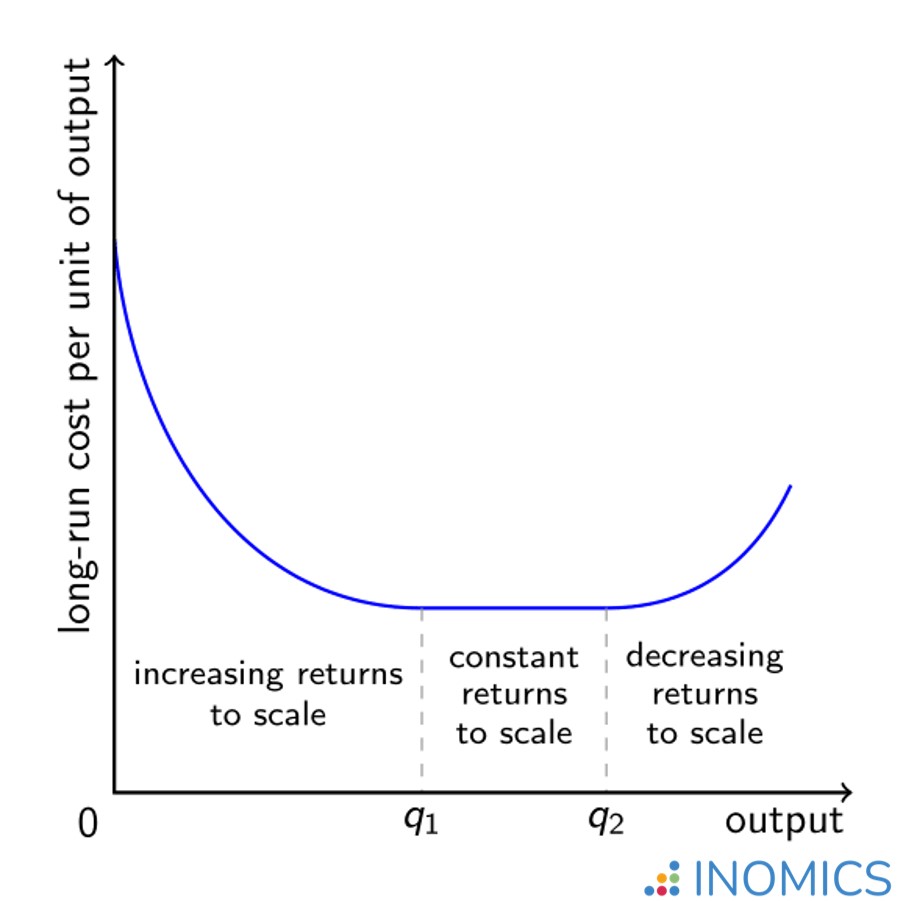Economics Terms A-Z
Economies of Scale
Read a summary or generate practice questions using the INOMICS AI tool
Economies of scale are the savings that occur when an entity grows in size and can produce output more efficiently or at lower cost. Here, the word “entity” can refer to individuals, organisations or even entire nations.
The economic theory of production divides costs into two main categories, fixed and variable. Fixed costs, or overheads, cover expenses that do not depend on the level of output in the short term: the cost of purchasing or renting land, buildings and machines, and the cost of running them. Variable costs depend directly on the level of output and include the cost of inputs that vary with output, such as raw materials and hours of labour.

Figure 1: Returns to scale as quantity increases
Average costs, or unit costs, are simply the total of all fixed and variable costs, divided by the level or units of output. As shown in the graph, unit costs are relatively high at low levels of production, which is due to fixed costs. As output increases, average costs fall as the outlays for land, buildings and machines are spread over more units. The entity is said to be experiencing increasing returns to scale: it is good for it to grow (between 0 and q1 output in the graph). However, unit costs will not decline indefinitely as machines suffer wear and tear and need to be repaired or replaced, and more buildings and land are required for greater production. Unit costs may settle at a minimum amount for a range of output levels. No further cost savings can be made simply by varying output: the returns to scale are then constant (between q1 and q2 output in the graph). Eventually, it becomes difficult to manage very large levels of output and unit costs start to rise: the entity is now experiencing decreasing returns to scale (beyond q2 output in the graph).
Economies of scale may not be due solely to production costs. Insofar as the entity is producing items for sale, conditions in the market for the items also determine economies of scale. It will only be profitable to increase production as long as there is sufficient demand for the item and/or the competition allows for it. This interdependence with the market makes it difficult to pinpoint the optimal size of an entity for efficient production.
Although economies of scale make intuitive sense in theory, they are difficult to measure and judge in practice. A degree of risk is involved in decisions made by individuals and organisations about growing capacity through new investments in capital (i.e. fixed costs). Investments can increase production at a lower unit cost but whether or not positive returns (and thus true economies of scale) are achieved also depends on sales and revenue. It is seldom easy to know whether “small is beautiful”, “big is better” or “too many cooks spoil the broth”.
Further reading
George Stigler won the Nobel Prize in Economic Sciences in 1982 for his contributions to the study of market processes and industry structures. In “The Economies of Scale” he contends that an organisation’s optimal size can be deduced most easily by observing an industry over time, classifying each organisation in the industry by market share and determining within the distribution where market share is increasing and where it is decreasing (Journal of Law and Economics, 1958).
Good to know
In the digital era of the Internet and Big Data, increased computing power and lower data-processing costs create plenty of opportunities to achieve economies of scale. The emergence of Big Tech (firms such as Amazon, Facebook and Google) is clear evidence of this. Yet even the scale of these giants is limited by demand in their respective markets and, increasingly, by government regulations aimed at constraining their power.
-
- Postdoc Job
- Posted 2 weeks ago
Postdoctoral Research Fellow Opportunity
At University of Notre Dame in Notre Dame, United States
-
- PhD Program, Program, Postgraduate Scholarship
- Posted 4 days ago
PhD Program in Economics - 6 Fully Funded Scholarships
at Luiss Guido Carli University of Rome in Rome, Italy
-
- Professor Job
- Posted 1 week ago
Assistant, Associate or Full Professor at Chung-Ang University
At Chung-Ang University in Seoul, South Korea












